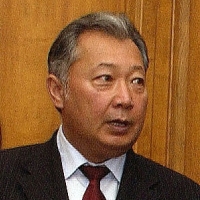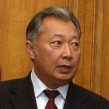
Bakiyev Faces Mass Murder Charges
Publication: Eurasia Daily Monitor Volume: 7 Issue: 210
By:

On November 17, a controversial trial began in Bishkek over the ousted former Kyrgyz president, Kurmanbek Bakiyev, and 28 members of his regime. Former defense minister Baktybek Kalyev is among the defendants. Bakiyev, however, along with six other defendants, is being tried in absentia (www.akipress.kg, November 17).
Eighty-six people died and 1,000 were injured as a result of the clashes in April between demonstrators and government forces. The majority of defendants present at the trial were members of Special Forces of the State Guard Service (Sluzhba Gosohrany): “Afla” and “Arstan.” that allegedly shot at civilian demonstrators to protect Bakiyev’s regime. The former president was infamous for taking control over all security structures in the country and appointing loyal allies to key security posts (EDM, March 22).
Bakiyev fled Kyrgyzstan on April 15 to Belarus and has reportedly remained there since. Bakiyev’s son Maksim is accused of large-scale corruption deals, including the illegal transfer of $170 million from Kyrgyzstan to offshore accounts on the night of April 7. Maksim Bakiyev is currently residing in the UK, awaiting a decision on his application for asylum. Kurmanbek Bakiyev’s brothers, Zhanysh and Akhmat, also charged for numerous crimes, are likely to be residing in Belarus as well. Bakiyev’s nephew has recently been charged on corruption allegations.
The trial opened in an atmosphere of chaos. Victims’ relatives interrupted the course of the trial by shouting, throwing objects and threatening defendants and their lawyers with physical violence (https://bulbul.kg/video:2714/). Hundreds of people gathered outside the building where the trial took place, demanding the toughest punishment for all defendants.
Local NGO’s accuse the government of failing to organize the trial in a more civilized manner (www.24.kg, November 17). These NGO’s suspect some government members are seeking to exact personal revenge against officials in the former regime. At the outset of the trial, the presiding judge sought to close access to the media, but the defendants’ side insisted on a media presence.
The Russian human rights NGO “Memorial” has published a report detailing Bakiyev’s use of force on April 7. According to the report, it remains unclear who shot at civilian demonstrators. Although the Kyrgyz government has accused eight members of Special Forces “Alfa” of killing civilians, the Kyrgyz military points to groups of unidentified snipers located inside the government headquarters building during the demonstration. The Memorial report features interviews with “Alfa” personnel who argue that they were only ordered to shoot at demonstrators’ legs in case crowds attempted to storm the government headquarters. Most victims, however, were shot in their heads, necks and chests (www.memo.ru).
The defendants’ side argued that only a few of the total 86 victims died as a result of long range shooting and the rest died from other types of injuries. The defendants’ lawyers requested a postponement of the trial. Pressured by the aggressive behavior coming from the victims’ side, the judge declined the requests. A thorough investigation into the April 7 violence is needed in order to form a more comprehensive picture. By rushing to open the trials, the government risks leaving some key questions unanswered. Importantly, the government’s reluctance to hold a fair and transparent trial diminishes Kyrgyzstan’s chances of having Maksim Bakiyev extradited from the UK, with whom it has no extradition treaty. The prospect of an unfair trial in Kyrgyzstan is reportedly Maksim’s strongest case for political asylum.
By forcing unfair trials, the government also risks angering residents of southern Kyrgyzstan, where Bakiyev still enjoys some popularity. The ethnic Kyrgyz population in particular deems the April 7 regime change to be illegitimate, and tends to accuse President Roza Otunbayeva of failing to prevent the ethnic violence last June. Meanwhile, the government depicts the victims of the April 7 clashes as national heroes. At the opening session of the new parliament, Otunbayeva highlighted that all members of the parliament must not forget that they came to power at the cost of 86 lives and that their work should be a tribute to those victims.
In addition to the trial in Bishkek, numerous controversial cases related to the ethnic violence in June are currently being processed in the southern parts of the country. Courtroom violence triggered by the defendants’ supporters is a common trait in almost all such trials. This legal mayhem in Kyrgyzstan highlights the need to fundamentally reform the country’s judicial system. Yet, for now, these trials have become an important test for the government itself, which, like the former regime, might opt to use the courts to achieve its own goals.




